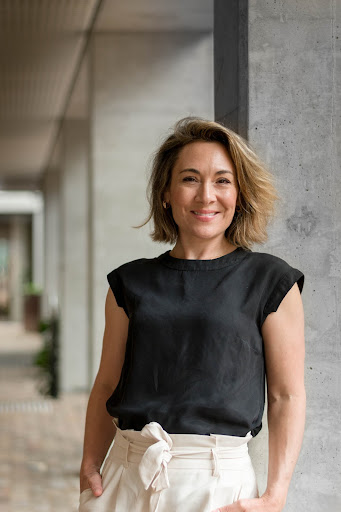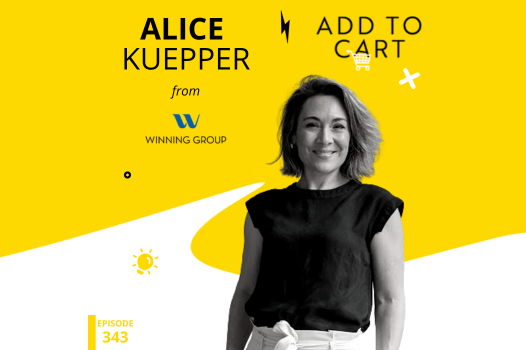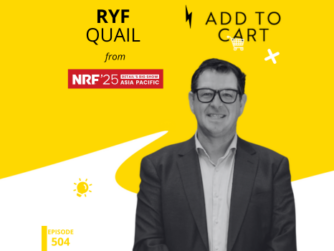In this episode of Add To Cart, we are joined by Alice Kuepper, Head of Sustainable Business and CSR at Winning Group
Alice landed her ‘dream job’ as Head of Sustainable Business and Corporate Social Responsibility at the home of Appliances Online and Winning Appliances in 2020. The broad and far-reaching role includes goals such as championing a circular economy, ensuring good visibility on supply chain ethics and forging meaningful connections with First Nations communities. It feels like destiny may have played a significant part in Alice’s career path. Growing up living in different countries and societies, studying sociology and then being exposed to the progressive world of ecommerce. I met Alice when she was the General Manager at Online Retailer nearly ten years ago but had no idea that this was her background – it was really fun to see how it has all come together for her to find her purpose. In this chat Alice shares how Winning Group tackles reverse logistics with a focus on sustainability, why slavery is not, sadly, a thing of the past and how businesses can map out a clear pathway to support reconciliation with a RAP.

“I really believe in the importance of what we say is what we think is what we do”
Alice Kuepper
Reconnecting to true purpose
“I think it’s been part of me since I was very young because I grew up with a very unconventional and probably a bit of a hippie mum. We travelled a lot when I was younger. And so I lived in different countries and I was exposed to a lot of different cultures early on. And I think through that, I developed a real sense of curiosity and acceptance of different cultures and different social structures and different ways of living. After school, I studied social sciences. I did a master’s degree in sociology. I spent all of my study years really looking into this.
And then I arrived in Australia fresh out of uni, fell into this different career path, quite a commercial career path actually, where it was all about project management, content production, stakeholder management. And I loved it. And I also was exposed to the fabulous e-commerce industry, which I think there’s so much to learn from e-commerce in terms of the entrepreneurship and that sense of launching new ideas and really creating greater outcomes in a way.
But then after 15 years in that career path, I was like, no, I need to get back to what is at the core of myself, I felt was my real purpose. And I did some training around environmental sustainability and then started to reconnect those two sides, I suppose, that commercial side and the social sciences side, and really dove back into a sustainability and social impact career path.”
Supply chain ethics
“I think at the core of what the modern slavery act does is it forces businesses to put a spotlight on their sourcing practices and their supply chain and to really start to understand where do our products come from and how they’re made and who makes them.
So, a lot of this is around supply chain ethics, but of course, environmental considerations come into this as well. And for us starting in this area, even things like mapping your supply chain, really putting an understanding and a map around which countries are our products coming from.
It’s been a real journey for example our teams to start to overlay questions into their sourcing that they’ve just not had before because traditionally buyers or procurement managers were tasked to have conversations around product and around pricing and not so much around ethics, sustainability and considerations of sourcing country.”
A guided journey to reconciliation for businesses
“There’s about 2,700 RAP organizations in Australia at the moment. And the RAP framework is accessed through Reconciliation Australia, an organization that helps businesses go through this process. And you register your interest and then you are sent resources and templates and I think this is really great for businesses because it can be really overwhelming for an organization to know where to start, this is such a complex and big issue to play in.
I think that for us the RAP framework was a really great way to, in a structured sense and in a sense that felt quite guided, to go through different initiatives and areas that an organisation can focus on to then achieve better outcomes for First Nations peoples and communities.”
Links from the episode
- Winning Group
- Appliances Online
- Reconciliation Australia
- Shopify Plus (sponsored)
- Signet (sponsored)
This episode was brought to you by…






